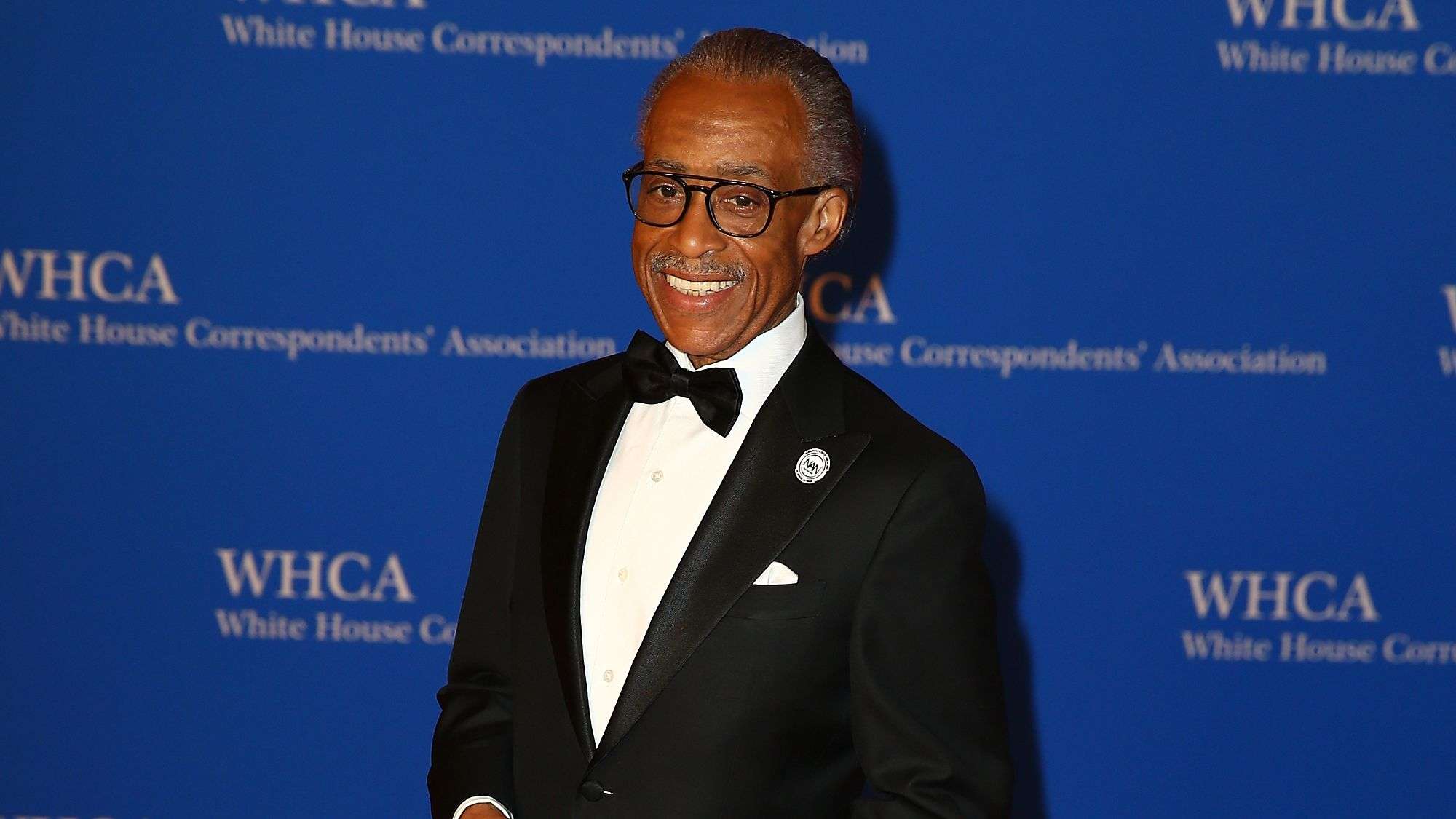Al Sharpton Net Worth: Unpacking The Wealth And Impact Of A Civil Rights Icon
You’ve probably heard of Al Sharpton. The name might ring a bell, especially if you’ve followed the civil rights movement or tuned into American politics. But have you ever wondered about Al Sharpton’s net worth? Let’s dive in and explore the financial journey of a man who’s been at the forefront of social justice for decades. Whether you’re a fan or just curious, this article will give you the inside scoop on his wealth, career, and legacy.
Al Sharpton isn’t just another public figure; he’s a symbol of resilience and activism. His life has been a rollercoaster of triumphs and controversies, but one thing is certain—his impact on American society is undeniable. So, if you’re here to learn about Al Sharpton’s net worth, you’re in the right place. We’ll break it down in a way that’s easy to digest, with some juicy facts sprinkled in for good measure.
Before we get into the numbers, let’s set the stage. Al Sharpton’s journey is more than just dollars and cents. It’s about the battles he’s fought, the voices he’s amplified, and the changes he’s helped bring about. This article will explore his financial standing, but we’ll also touch on his biography, achievements, and the controversies that have shaped his public image. Ready? Let’s go!
- Married At First Sight Season 14 Love Drama And Everything In Between
- Brooke Dorsay A Rising Star In The Entertainment World
Biography of Al Sharpton: A Man of Many Hats
To truly understand Al Sharpton’s net worth, we first need to look at the man behind the money. Born Alfred Charles Sharpton Jr. on October 3, 1954, in the Bronx, New York, Sharpton grew up in a household that valued activism and faith. His early years were steeped in the church, where his mother, Ada, was a choir director. It’s no surprise that he found his calling as a preacher at the tender age of four.
By the time he was a teenager, Sharpton was already making waves in the civil rights movement. He organized the National Youth Movement, which aimed to empower young people and fight racial injustice. This early activism laid the foundation for his future career as a prominent voice in American politics and social justice.
Al Sharpton’s Early Life and Career
Let’s rewind a bit. Sharpton’s upbringing wasn’t easy. Growing up in a predominantly African American neighborhood, he witnessed firsthand the struggles of racial discrimination and poverty. But instead of letting these challenges define him, he used them as fuel to drive change.
- Jim Cramer Net Worth The Inside Story You Need To Know
- Aylin Mujica The Rise Of A Colombian Powerhouse In Entertainment And Beyond
His career took off in the 1970s when he became a close associate of Jesse Jackson. Together, they worked on various civil rights campaigns, further cementing Sharpton’s reputation as a leader in the fight for equality. By the 1980s, Sharpton had established himself as a formidable force in the political landscape, often appearing on talk shows and using his platform to speak out against injustice.
Al Sharpton Net Worth: The Numbers Game
Now, let’s cut to the chase. As of 2023, Al Sharpton’s net worth is estimated to be around $5 million. But how did he amass this wealth? Let’s break it down:
- Ministry and Speaking Engagements: Sharpton’s background as a preacher has been a significant source of income. He’s known for his powerful oratory skills, which have earned him lucrative speaking opportunities.
- Media Appearances: Sharpton has been a regular on TV and radio shows, offering his insights on current events and social issues. His presence in the media has not only boosted his profile but also his bank account.
- Political Campaigns: Although Sharpton hasn’t held public office, his involvement in political campaigns has been a steady source of income. He’s often hired as a consultant or spokesperson for various causes.
- Books and Publications: Sharpton has authored several books, including “The Rejected Stone: Al Sharpton and the Path to American Leadership.” These publications have contributed to his overall earnings.
How Al Sharpton Builds His Wealth
Sharpton’s financial success isn’t just about one big payday. It’s the result of decades of hard work and strategic decisions. Here are some key factors that have contributed to his net worth:
- Entrepreneurial Spirit: Sharpton has always been a savvy businessman. He founded the National Action Network (NAN), a nonprofit organization that advocates for civil rights and social justice. This organization has not only advanced his cause but also generated revenue through donations and partnerships.
- Brand Endorsements: Over the years, Sharpton has collaborated with various brands, leveraging his influence to promote products and services. These partnerships have been lucrative for both parties involved.
- Real Estate Investments: Like many successful figures, Sharpton has dabbled in real estate. His investments in properties have added to his financial portfolio.
Al Sharpton’s Financial Journey: From Preacher to Powerhouse
Sharpton’s journey from a young preacher to a civil rights icon hasn’t been without its ups and downs. In the early days, he relied heavily on donations and grassroots support to sustain his activism. But as his influence grew, so did his opportunities for financial gain.
One of the turning points in Sharpton’s career was his run for the U.S. Senate in 1992. Although he didn’t win, the campaign put him on the national stage and opened doors to new financial prospects. From there, he continued to expand his reach, using his platform to address issues like police brutality, racial inequality, and economic disparity.
Controversies and Challenges
No discussion about Al Sharpton would be complete without mentioning the controversies that have shadowed his career. Critics have accused him of using his activism for personal gain, citing his lavish lifestyle and high-profile legal battles. However, Sharpton has always maintained that his wealth is a reflection of his hard work and dedication to the cause.
Despite the criticism, Sharpton has remained a formidable presence in the fight for social justice. His ability to navigate the complexities of politics and media has allowed him to build a substantial financial empire while staying true to his principles.
Al Sharpton’s Influence on American Politics
Sharpton’s impact on American politics cannot be overstated. He’s been a vocal advocate for marginalized communities, using his platform to push for meaningful change. His work with organizations like NAN has been instrumental in shaping public policy and influencing legislative decisions.
One of Sharpton’s most notable achievements is his role in bringing attention to cases of police brutality and systemic racism. His involvement in high-profile cases, such as the deaths of Eric Garner and Michael Brown, has brought national attention to these critical issues.
Al Sharpton’s Legacy
As Sharpton continues to shape the conversation around civil rights, his legacy is secure. He’s inspired a new generation of activists to carry the torch and fight for justice. His work has laid the groundwork for future leaders to build upon, ensuring that the fight for equality remains at the forefront of public discourse.
Al Sharpton’s Personal Life: Beyond the Public Eye
While Sharpton’s public life is well-documented, his personal life is a bit more private. He’s been married to Kathy Jordan since 1987, and the couple has two daughters. Despite the demands of his career, Sharpton has managed to maintain a close-knit family, often crediting his wife and children as his biggest supporters.
Here’s a quick glance at some of Sharpton’s personal details:
| Full Name | Alfred Charles Sharpton Jr. |
|---|---|
| Birthdate | October 3, 1954 |
| Place of Birth | Bronx, New York |
| Spouse | Kathy Jordan |
| Children | Two daughters |
Family and Relationships
Sharpton’s family has played a crucial role in his life and career. His mother, Ada, was a guiding force in his early years, instilling in him a strong sense of morality and purpose. His wife, Kathy, has been a constant companion, supporting him through the highs and lows of his activism.
When it comes to his daughters, Sharpton has often spoken about the importance of raising them with a sense of responsibility and compassion. He believes that the next generation holds the key to a better future, and he’s committed to equipping them with the tools they need to make a difference.
Al Sharpton’s Net Worth in Perspective
Now that we’ve explored the various facets of Al Sharpton’s life, let’s put his net worth into perspective. While $5 million might seem like a lot, it’s important to remember that Sharpton’s wealth isn’t just about the money. It’s about the impact he’s made and the lives he’s touched.
Compared to other public figures, Sharpton’s net worth might not be the highest. But what sets him apart is his commitment to using his resources for the greater good. Whether it’s through his activism, media appearances, or business ventures, Sharpton has consistently prioritized the needs of his community over personal gain.
What the Future Holds
As Sharpton continues to evolve, so too does his financial landscape. With new opportunities on the horizon, it’s likely that his net worth will continue to grow. But one thing is certain—his dedication to social justice will remain unchanged.
Sharpton’s future may include more books, media projects, and possibly even a return to politics. Whatever path he chooses, one thing is clear: he’ll continue to be a voice for the voiceless and a champion for change.
Conclusion: Al Sharpton Net Worth and Beyond
In summary, Al Sharpton’s net worth is more than just a number. It’s a testament to his hard work, resilience, and unwavering commitment to social justice. From his humble beginnings as a young preacher to his current status as a civil rights icon, Sharpton has left an indelible mark on American society.
As you’ve read through this article, you’ve gained a deeper understanding of Sharpton’s financial journey and the factors that have contributed to his success. But more importantly, you’ve seen how his wealth has been used to drive meaningful change.
So, what’s next? If you found this article informative, don’t hesitate to share it with your friends and family. And if you’re hungry for more content like this, be sure to check out our other articles. Together, let’s keep the conversation going and continue to learn from the remarkable stories of those who’ve shaped our world.
Table of Contents
- Biography of Al Sharpton
- Al Sharpton’s Early Life and Career
- Al Sharpton Net Worth
- How Al Sharpton Builds His Wealth
- Al Sharpton’s Financial Journey
- Controversies and Challenges
- Al Sharpton’s Influence on American Politics
- Al Sharpton’s Legacy
- Al Sharpton’s Personal Life
- Al Sharpton’s Net Worth in Perspective
Article Recommendations
- Hugh Hendry The Maverick Investor Redefining Financial Wisdom
- Joe Theismann Net Worth The Inside Scoop On The Nfl Legendrsquos Wealth



Detail Author:
- Name : Remington Cronin
- Username : aliya78
- Email : cpaucek@marvin.net
- Birthdate : 1993-12-10
- Address : 89672 Lance Mews Dillanshire, AZ 69648-0911
- Phone : (320) 464-4305
- Company : Littel, Turner and Pfannerstill
- Job : Team Assembler
- Bio : Iure incidunt unde consequatur perspiciatis. Quo earum quo harum laboriosam. Ratione dolores fugit quis consequatur voluptas.
Socials
linkedin:
- url : https://linkedin.com/in/ed_klein
- username : ed_klein
- bio : Soluta quasi tempore ut nisi.
- followers : 6993
- following : 2780
tiktok:
- url : https://tiktok.com/@klein1991
- username : klein1991
- bio : Doloremque maxime nihil natus nostrum beatae. Error et suscipit deserunt.
- followers : 1167
- following : 730